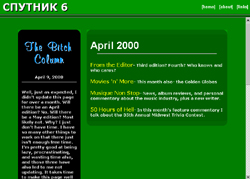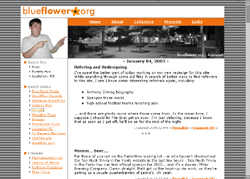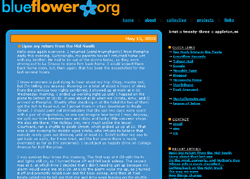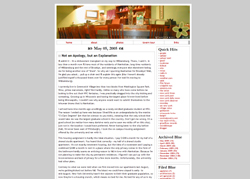» blog archives
the blogger years
malapropism
crazy
the movabletype years
my name in print
blogging tools
When war broke out this spring in Iraq, thousands of reporters descended on the region to document the conflict.
Out of the crowded field emerged Salam Pax, a 29-year-old Iraqi architect whose missives from the front were said to be attracting 20,000 readers at the height of the war.
The thing was, Pax wasn't working for a newspaper, magazine or television network. Readers couldn't even be sure if "Salam Pax" was his real name or if his reports were authentic. All they had to go by was his Web log, which he called "Where is Raed?" (http://dear_raed.blogspot.com).
A Web log, or blog, is an online journal that anyone floating in cyberspace can read. Pax's blog was the only known native Web chronicle coming out of Baghdad during the war, and his first-person accounts riveted thousands of surfers looking for an alternative to mainstream media coverage.
Pax is one of hundreds of thousands, perhaps millions of people who are putting their diaries online for anyone to peruse. Bloggers range from well-known political pundits such as Andrew Sullivan, who uses his blog "The Daily Dish" (www.andrew sullivan.com) to offer instant commentary on the latest headlines, to regular people such as Dave Walker, a British Web editor and cartoonist who describes the minutia of his every move on the self-described "Dullest Blog in the World" (www.wib site.com/wiblog/dull).
Just as Pax wrote about what was going on around him, Kristopher Koroch pens daily entries about his life on his blog, www.blueflower.org. But since Koroch is a 23-year-old living a relatively normal life in Appleton, his blog veers from matters of life and death toward the mundane, whether it be barhopping downtown or waiting for a Post-Crescent photographer to show up to shoot pictures for this article.
"I slept right through my alarm this morning, meaning I also slept through the appointment time to have my car checked out," reads a recent entry. "I called them up and they said I could bring my car down between 10 and 10:30, which is what Iím leaving to do in just a few minutes."
Not terribly gripping, but it also is not intended for mass consumption. For Koroch, doing a blog is a simple way to keep friends and family members updated on what he is up to.
"Anybody can do it," Koroch said of blogging. "If you know how to sign on the Internet or use e-mail, you can do this."
While there is no guarantee that anybody is actually reading your blog, there is also nothing keeping a complete stranger from hanging on your every word.
"A big part of blogging that's different from regular publishing is it's all about making connections with other people," said Evan Williams, co-founder of popular Web log service www.blogger.com. "I think it hits on the basic human desire of expression."
Ryan Buck, 26, of Oshkosh has been blogging since February 2001 and updates his site (http://plinko.blogspot.com) eight or nine times a week. Like Koroch, he uses the site primarily to keep loved ones abreast of his comings and goings. Buck doesn't expect the blog to interest anyone outside of his circle, but because he knows anyone and everyone has access to the site he has learned not to get too specific in his entries. Using last names, for instance, is a no-no.
"You use someone's last name and six weeks later they Google that name and your site pops up," Buck said. "I want to make it nonspecific enough to where I don't get in trouble."
Other Wisconsinites looking for an outlet for their musings on life and how to live it also have embraced blogging as an easily accessible form of mass media. Longtime blog writer and blog reader Jennifer Pfafflin, a 23-year-old graduate student at the University of Wisconsin-Madison, has compiled a list of Wisconsin-related blogs she calls Wiscoblogs (www. aworkingproject.org/wiscoblogs). The tally stands at 98, and it keep growing every month.
"It's been growing pretty fast considering there's no sort of advertising for it," Pfafflin said. "I don't proactively search for Wisconsin blogs, though I'm always interested when I stumble upon one. But I think I get over three or four new sites a month, which is good for me because I'm a slacker when it comes to updating the main page."
Because the Web is so vast, it is difficult to pinpoint exactly how many blogs are up online. But the number is considerable. According to Williams, there are just more than 1 million registered users on Blogger.com.
Blogs are as old as the Internet, but mainstream consciousness has come "in several different waves," Williams said. Sept. 11 and the Iraq war both gave inspiration to amateur pundits to start their own blogs as vehicles for political speech. Others have used blogs to discuss more personal matters such as hobbies, favorite bands and movies and even family and relationship issues.
The popularity of blogs derives in part from their simplicity.
Blogger.com offers free Web logs that allow users to simply type and post. Before the site was launched by San Francisco-based company Pyra Labs in August 1999, setting up your own blog required computer programming knowledge. Even for experienced technophiles, "to do it by hand, it was just tedious," said Williams, who was CEO of Pyra Labs until Google bought the company in February.
Early blogs were like Internet bookmarks that collected links to other Web sites related to a general topic. The operator would offer some commentary, but not much. Over time, however, bloggers started creating content and doing their own reporting, sometimes beating the media at their own game.
Devoted blogger Matt Drudge put his site "The Drudge Report" (http://drudge report.com) on the map by covering President Clinton's sexual misdeeds with Monica Lewinsky before television and newspapers jumped on the story. More recently Washington, D.C., freelance writer Joshua Marshall was given credit for tipping the media to controversial comments made by then Senate majority leader Trent Lott at a birthday party for Strom Thurmond.
And don't forget about Salam Pax. Not only was he legit (Salam is his real name, Pax is a pseudonym), but he has since been hired as a columnist for Britain's Guardian newspaper and book publishers are reportedly interested in giving him a deal.
Not bad for a guy who was a media nobody just a few months ago.
» design history

planet starraver (12/99-6/00)

sputnik 6! (1/00-4/00)

blueflower.org v1.0 (6/00-6/01)

blueflower.org v2.0 (6/01-11/01)

blueflower.org v3.0 (11/01-6/02)

blueflower.org v4.0 (6/02-7/02)

blueflower.org v5.0 (7/02-1/03)

blueflower.org v6.0 (1/03-3/03)

blueflower.org v7.0 (3/03-6/03)

blueflower.org v8.0 (6/03-7/04)

blueflower.org v9.0 (10/04-12/04)

blueflower.org v10.0 (12/04-7/05)
